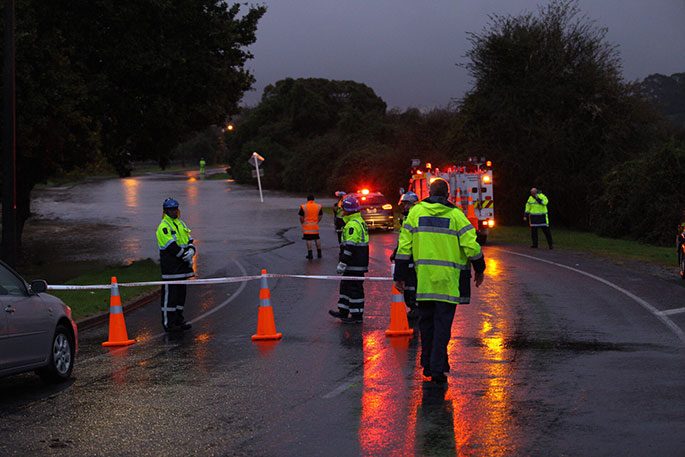A blame game of which authority is at fault over the aftermath of Rotorua's April flooding is not the answer, says a panel set up to investigate the sudden torrent.
And Rotorua mayor Steve Chadwick says the flooding put to bed the notion that climate change is not real.
A panel set up by the BoP Regional Council and Rotorua Lakes Council was critical of aspects of the way the authorities responded to the flooding.
Panel chair Judith Stanway oversaw a report critical of the responses of both councils in not taking the right proportions to mitigate floods.
Today, Rotorua mayor Steve Chadwick and regional council chairman Doug Leeder along with Stanway, held a press conference.
Coping with variable weather patterns and future proofing flood risks in Rotorua was the central theme of the press conference, while faults were acknowledged.
An unprecedented level of rainfall (165 millimetres, 1.5 times the April usual in 36 hours) on April 28-29 this year caused the Ngongotaha Stream to overflow, flooding the Western Road area.
Further, sewerage system aggravated the situation through direct contamination of flood waters, a report said at the time.
Stanway, ex-Waiariki Maori Party MP and leader Te Ururoa Flavell and two engineers conducted a report commissioned by both authorities soon after the foods which ravaged an area at Ngongotaha and wider parts of the Rotorua district.
But the focus was on Ngongotaha, though the wider catchment was affected, says Stanway.
Chadwick, describing it as 'comprehensive”, said the report which recommends an action plan was first about reducing the flood risk.
'Once we start an action plan, we want to involve the whole community.”
Stanway, a Rotorua accountant, said by the end of the report, the panel had 24 recommendations. 'They are not one-off type things that you can tick off,” Stanway says.
She says it's not a case of where the fault lay, or who was to blame, but a matter of 'where do we go now?”
Leeder acknowledged a 'comprehensive report” touched on people's lives and properties and how to mitigate risk.
'We have between the two organisations taken the initiative to work together on some of these recommendations well before this report came out because it was the sensible thing to do.”
But solutions would not be 'ready tomorrow,” says Leeder. The councils were working on a suite of proposals to take to the community.
Chadwick says she's pleased the report had been tabled eight months after the April flooding.
To a question, Chadwick said the councils had a plan to mitigate flood response.
'We followed what we had in front of us.” The report before them today concentrated on the technical side of the operation.
Leeder says the 'event” was short; a forecast did not indicate the extent of the deluge to come.
'This was an event in which there were so many mills [millilitres] in three hours and the time for the community to react."
Chadwick says this also applied to the wider Rotorua area.
While a greater collaboration between the two councils was called for, Chadwick said the community was clear.
'They started ringing the call centre, not the regional council – it was their community and they looked for leadership responsibility there. The team got there very quickly.”
Leeder says that only 12 months earlier, flooding occurred in Paradise Valley and remediations were still 'being finished”.
At the time the regional council along with the RLC told the community if they wanted more comprehensive approach to the management of the Ngongotaha Stream, 'come back and see us”.
To date, he said, he was not sure whether that option had been undertaken.
Now with more drains, properties and houses it was a case of what the community wanted, says Leeder.
Chadwick says the community had 'an intelligence of its own”. She said she sensed it wanted to get on in the future and 'get on quite quickly”.
Chadwick says the reported had not been costed. It was important to obtain a report. It was a matter of moving on and doing the right thing, the role of both authorities.
'I think it's put to bed the perception that climate change isn't real – we're all facing that.”
Both councils now realised they had to have a resilient plan, Chadwick says.



0 comments
Leave a Comment
You must be logged in to make a comment.